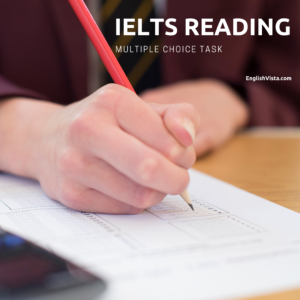
In multiple choice reading tasks in IELTS, you will answer questions about a reading passage. The questions will provide 3-4 possible options and you need to choose the correct answer. This involves using your scanning skills to locate the relevant information to answer the question, your comprehension skills to understand the text and your ability to paraphrase information.
To help support you with the multiple choice tasks in IELTS, here are some of our top tips.
- Read the question carefully. Be sure that you understand the question so that you don’t get caught out.
- Locate the correct information in the passage and use this to select the best answer.
- Do not spend too long on this task – each question is worth one mark only.
- Remember, answers will usually be in order.
- Make sure you know how to show your answer – do you need to provide a letter or number to show the option you are choosing?
- Take the time to ensure you are answering the question – just because a number in one of the answers is also in the text doesn’t mean it is the CORRECT answer!
As with any part of the IELTS test, practice makes perfect. So be sure to use our other Multiple Choice Practice Tasks to help develop your ability and skill.
Passage:
China Bans Children Playing Video Games
China has announced drastic curfew measures on children in an attempt to curb video game addiction in the country. Gamers under the age of 18 will be banned from playing online games for more than 90 minutes on week days and will be forbidden from playing between 10pm and 8am. On weekends and public holidays they will be allowed to play up to three hours per day.
Official government guidelines outlining the new restrictions were issued by China’s General Administration of Press and Publication and will be imposed directly through gaming platforms operating in the country. A spokesperson for the administration told state-run Xinhua News Agency that the measures were designed to protect the “physical and mental health of minors”. The rules also include limitations on the amount of money children can spend within games, with gamers under 16 years old allowed to spend up to 200 yuan (£22) per month, and those between 16 and 18 able to spend 400 yuan.
China is the world’s second biggest gaming market behind the US but authorities in the country have repeatedly criticised the negative impact video games can have on young people. A study in 2015 found that 500 million Chinese citizens suffered from visual impairment, which researchers blamed on the rise of mobile phones and online games.
Last year, the World Health Organisation recognised video game addiction as an mental health disorder. Internet gaming disorder causes someone to have “significant issues with functioning” due to the addiction, according to the organisation. It is officially characterised by “impaired control over gaming, increasing priority given to gaming over other activities to the extent that gaming takes precedence over other interests and daily activities, and continuation or escalation of gaming despite the occurrence of negative consequences”.
Text adapted from: https://www.independent.co.uk/life-style/gadgets-and-tech/gaming/china-gaming-ban-video-game-addiction-a9188806.html
Questions:
Choose the correct letter A-D.
- Children are allowed to play computer games for how long on Saturday and Sundays in China?
- Less than 3 hours per day
- More than 3 hours per day
- 0 hours
- Between 10pm and 8am
- Children over 16 are allowed to spend how much per month on gaming in China?
- Less than 200 yuan
- More than 400 yuan
- Exactly 200 yuan
- Up to 400 yuan
- What illness do Chinese authorities blame on the over use of computer games?
- drug addiction
- sight problems
- alcohol addiction
- joint problems
Answers:
- a
- d
- b
New Vocabulary to Learn!
visual impairment = loss of the ability to see
drastic = something that is radical or extreme
curfew = an order specifying a time during which certain rules apply
curb = to put a restrain on something; to stop something
forbidden = not allowed
outlining = a general description or plan showing the main features of something
restrictions = rules that limit or control someone
imposed = forced on someone
limitations = restrictions
characterised = the typical features of something
